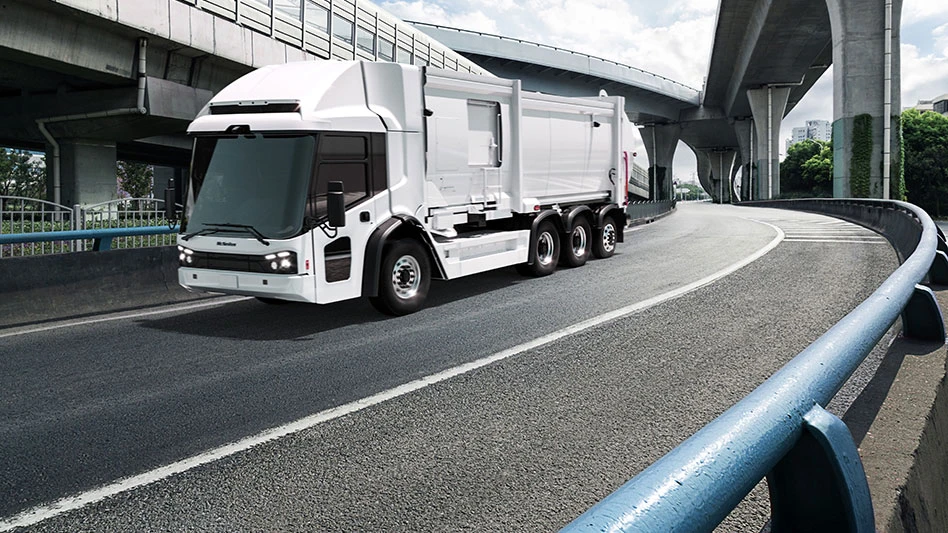
McNeilus Truck and Manufacturing Inc., a division of Oshkosh Corp. based in Oshkosh, Wisconsin, showcased its newest electric offerings at this year's WasteExpo, including the Volterra ZSL electric refuse collection vehicle, North America’s first fully integrated electric vehicle (EV) built specifically for refuse programs.
The truck’s fully integrated design, with the body and chassis built as one, is specifically built for a side-loading application, with a front-loader piloting on the same chassis this summer, explains Lee Dreas, vice president and general manager of McNeilus Truck and Manufacturing.
McNeilus touts the EV’s driver-first design and emphasis on safety, including an enhanced field of view from a 360-degree windshield. A spacious cab has been designed for driver comfort and safety, providing almost 38 percent more space compared to the industry average.
Direct visibility helps drivers see obstacles and can help minimize potential incidents on the road, Dreas says. Additionally, an advanced driver-assistance system includes blind-spot monitoring, 360-degree camera view, forward and rear collision notification, park assist, backup camera, rear cross traffic assist, lane departure warning and advanced emergency braking.
The purpose-built Volterra ZSL is certified zero-emission by the United States Environmental Protection Agency and can help achieve customer sustainability goals. With an electrified drivetrain, electric-axle architecture, smart battery system and cooperative regenerative braking, the vehicle can handle an all-day route on a single charge with zero emissions.
“We only use power when we need power, everything else is idle,” Dreas says.
The Volterra features the McNeilus Zero Radius vertical lift arm, with a 6-foot standard reach arm for dense city routes and a 12-foot arm for collect6ion near parked cars, and a tight turning radius to maneuver around cul-de-sacs and tight corners.
The McNeilus ePTO (electric power takeoff) technology is a self-contained electric power system that is “chassis agnostic,” Dreas says, meaning it can be used with multiple electric chassis brands. McNeilus’s proprietary technology has been designed for use with a standard sideload body, the technology offers versatility for commercial applications.
The McNeilus ePTO refuse body uses an average of 6-8% battery power, leaving sufficient battery power for the chassis. It is capable of collecting up to 1,200 homes in 10 hours, running 80 miles and making two trips to the landfill on a single charge, according to the company.
Common service parts and standardized connections provide simplified maintenance and service training. Additionally, the ePTO hydraulic pump and motor are “whisper quiet,” offering quiet operations idea for residential routes.
Highlighting the company's dedication to continually updating its products, McNeilus also displayed its redesigned Meridian Front Loader at WasteExpo, McNeilus has transformed front loader collection for commercial and residential routes. The Meridian is the first refuse vehicle made with fossil-free steel, a medium-duty build offering heavy-duty characteristics.
Phoenix-based Republic Services Inc. is running a pilot program using fully integrated Volterra ZSL electric refuse vehicles until the end of December. Following the pilot program, McNeilus will go into production on the Volterra, Dreas says.
“The pilot has confirmed our beliefs on how efficient EV can be. The truck has been able to go 70 to 80 miles and pick up 1,000 cans, which is far beyond what we had initially expected,” he says.
Latest from Waste Today
- Smart sorting robots, proven in the toughest waste streams
- ROTAC® Tippers: Made to lift
- WM reports positive Q1 earnings
- Circular Action Alliance adds to founding members
- Mac Trailer Enterprise to highlight waste solutions at WasteExpo
- Terex Recycling Systems launches electric low-speed shredder
- Arcwood Environmental appoints chief digital and information officer
- Updated: Washington legislature passes EPR bill





